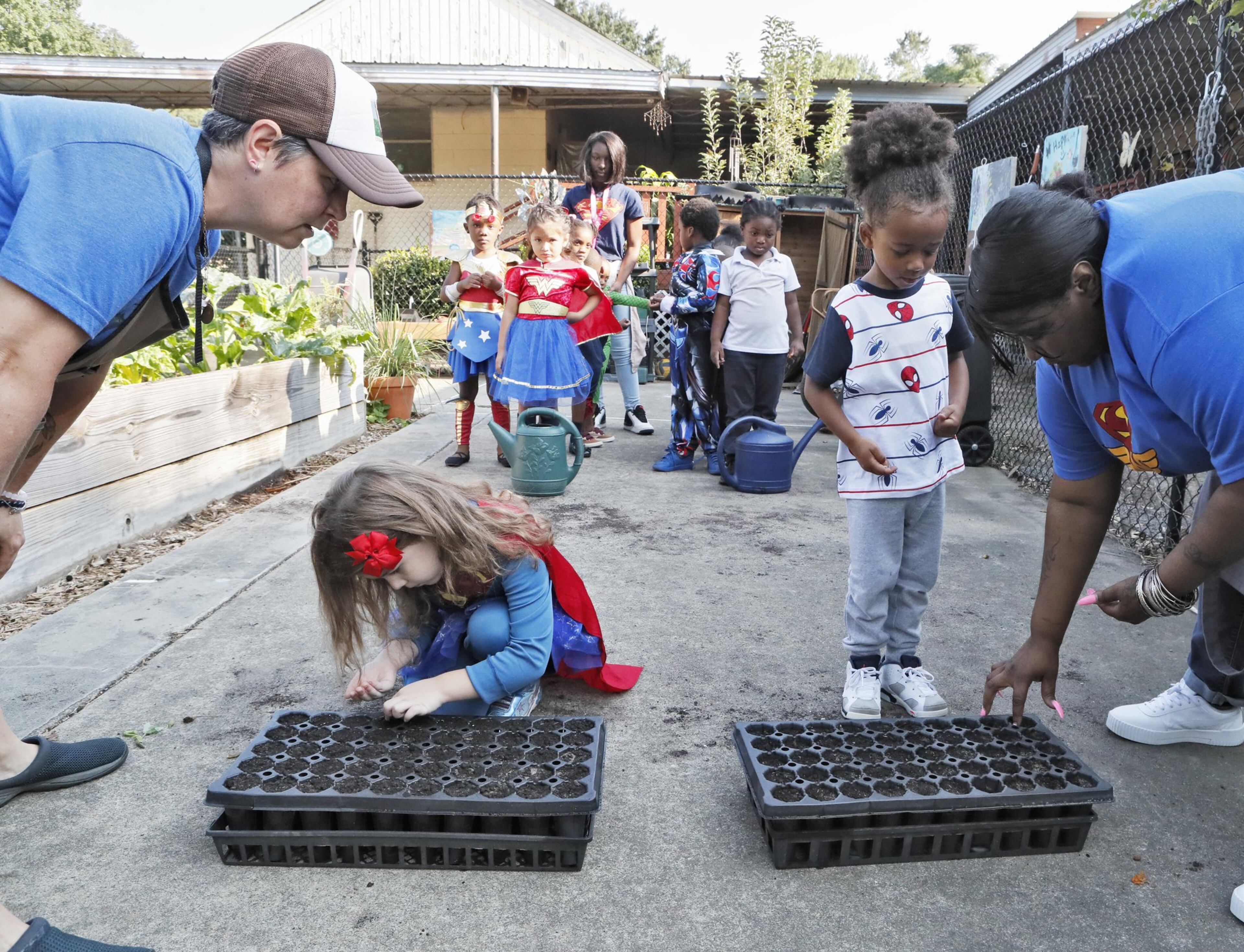Preschool growing fruits and veggies ordered by city to stop sales

The national farm to school movement has grown so fast that it is challenging traditional notions of city planning, and a Clayton County preschool is at ground zero in the conflict.
The Little Ones Learning Center in Forest Park has a nationally recognized garden-based education program. In 2015, it merited a visit by then-first lady Sandra Deal, who watched the children tasting fresh juice. “It was a treat to see your early learning center practicing good nutrition with a bountiful garden,” she wrote in a letter to the school.
The primary goal has been to influence food preferences of children and their parents, but the preschool also wants to give residents in the surrounding neighborhood access to quality fruits and vegetables. In 2018, Little Ones started a bimonthly farm stand for sales to parents and neighbors. The produce was both grown in the garden and brought in from nearby farms.
This summer, City Hall shut it down. Little Ones, it turns out, is in a residential area that is not zoned for farm stands.
“Anywhere you live, you’ve got to have rules and regulations,” Forest Park City Manager Angela Redding said. “Otherwise, you would just have whatever.”

Little Ones proprietor Wande Okunoren-Meadows believes the law needs to change. She went to a City Council meeting in early September to say so. The city has so far refused to amend it, but has offered to let her sell her goods on a city-owned property. It is outside the neighborhood Okunoren-Meadows wants to serve, though, and is an inconvenient location for the parents who buy much of the food.
She isn’t worried just about her school. She wants a law that allows other preschools to follow her lead and expose more residents to the taste of organic kale, sweet peas and watermelon.
>>RELATED | Farm-to-school win for students and local farmers
“If they’re going to Piggly Wiggly and all they’re seeing is Taki chips and chemicals, that’s all they’ll know,” she said. “We just need to bring our city up to date.”
Her conflict with City Hall shows how much the movement has grown, and may presage other zoning battles across Georgia, and the nation, as more sites try to bring produce to the people.
“She’s been a leader in the farm to early care and education movement, and has created a model program at Little Ones Early Learning Center,” said Kimberly Della Donna, the farm to school director for Georgia Organics, a nonprofit organization that champions sustainable foods and local farms in the state.

Anna Mullen, spokeswoman for the National Farm to School Network, said Little Ones is “the gold standard” for what early learning centers should be doing with food. Lacy Stephens, the group’s farm to early care program manager, said schools typically encounter pushback from health departments concerned about serving garden-grown food, but she’s not heard of a zoning conflict like this one. “Other schools haven’t done this yet,” she said. “Sometimes you have to push the barrier until you figure it out.”
Some Little Ones parents are unhappy with the loss of the farm stand.
“Disheartening” was Ashley Manning’s reaction. A nutritionist, she chose the school because of its natural food ethos and its mission to provision the neighborhood. When she picked up her son, Judah, 4, on a recent afternoon, she smelled watermelon on his breath and noted a fresh red stain on the front of his shirt. The kids had harvested one of the garden’s four watermelons that day.
Judah claimed to dislike vegetables, yet said his favorite fruit was carrots, which delighted his mother.
“It just helps when families around here can get nutrition-rich food,” she said.
>> MORE | Georgia schools find meals good for kids that kids actually eat
“Tragic” is how Jonika Swayne, who has a daughter there, put it. The school offered deep discounts to food stamp recipients who walked in from the neighborhood. “I feel like it’s a great experience for the community and for the kids,” she said. “It’s very, very hard to get fresh produce.”
Sharona Fountain, owner of The Learning Station preschool in nearby Ellenwood, said Okunoren-Meadows is well-known in the child care community for her food garden.
“They do an awesome job of teaching their children about agriculture,” Fountain said. The Learning Station has a garden, too, but it’s smaller. It has yielded bell peppers that go into spaghetti lunches, and cucumbers for salads. She has considered expanding to include sales, but worries she would face the same obstacle as Little Ones.

Redding, the Forest Park city manager, said the farm stand was a safety concern. Parked cars lined the street the day a code enforcement officer shut it down. Okunoren-Meadows still has options. Besides relocating her farm stand to the city property, she can file for a special permit each time she wants to sell. There is a $50 fee that covers any needed police presence or other safety measures, Redding said, adding the city “can work with her” on the cost.
“If we change the ordinance, then that means every person in a residential area could have a farm stand, and we could end up with one on every corner,” Redding said.
That is the core of the disagreement: the old order versus new ways of living.
“If everyone wants to grow food, I’m so fine with that,” Okunoren-Meadows said.
She doubts farm stands would proliferate, especially not in high-poverty neighborhoods. Little Ones sold maybe $150 worth of produce each time she put up the farm stand, with two or three dozen customers coming around. Subtracting the hourly wages for her staffers who worked the stand, it was a money loser, Okunoren-Meadows said. She suggested the city could exempt educational facilities from the farm stand prohibition.
Okunoren-Meadows started her garden in 2012 and was appointed to an early education advisory subcommittee for Gov. Nathan Deal that met from 2015 to 2016. In 2017, the preschool was among 18 farm to school demonstration sites selected by Quality Care for Children, a nonprofit with government and private funding. Okunoren-Meadows has presented at a national child nutrition conference, and her preschool is a field trip destination when the conference comes to Atlanta next year.
Parents such as Swayne appreciate the garden’s influence on their children.
Her daughter Ajah, 4, said she likes watering the plants (“it helps it grow”), and brought home fresh peppermint recently. Swayne helped her put the stems in water to propagate more.
“I feel like all schools should have this,” Swayne said. “This is what kids need to learn.”
Editor’s note: This story has been updated to correct the description of the nonprofit organization Georgia Organics.
A brief history of the farm to school movement
Late 1990s: Farmers and schools in produce-rich California and Florida connect, as schools look for locally grown food and farmers look for a new market, said Lacy Stephens of the National Farm to School Network.
Mid 2000s: Enough independent state groups, such as Georgia Organics, have formed that they unite under one banner — the National Farm to School Network, bringing lobbying heft to Washington.
2010: With first lady Michelle Obama focused on childhood nutrition, President Barack Obama establishes a task force on childhood obesity; and advocates get a win in the Healthy, Hunger-Free Kids Act, establishing $5 million in annual funding for the U.S. Department of Agriculture's Farm to School Grant Program.
2016: Georgia Farm to Early Care and Education Coalition forms.
2019: A bipartisan group of U.S. senators, including Georgia's David Perdue, a Republican, co-sponsors the Farm to School Act, which would increase the USDA farm to school grant to $15 million.



